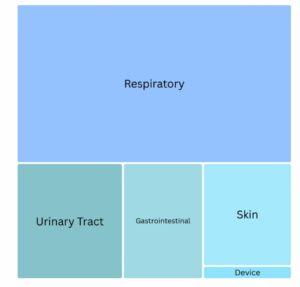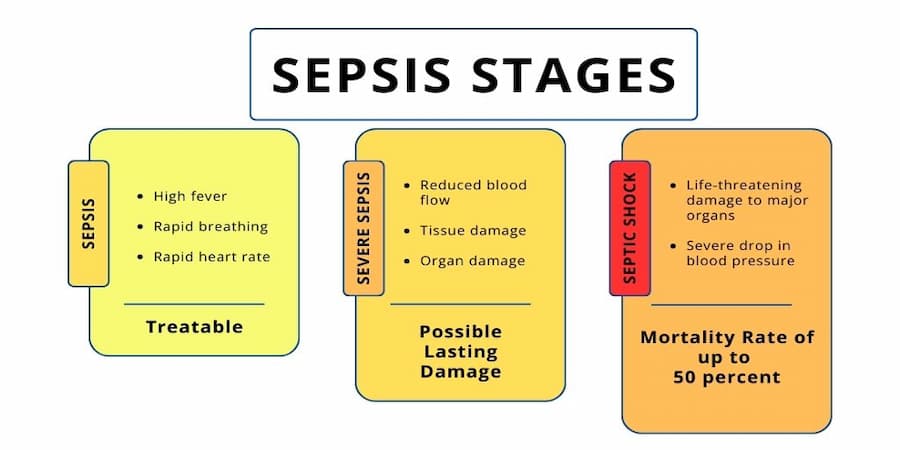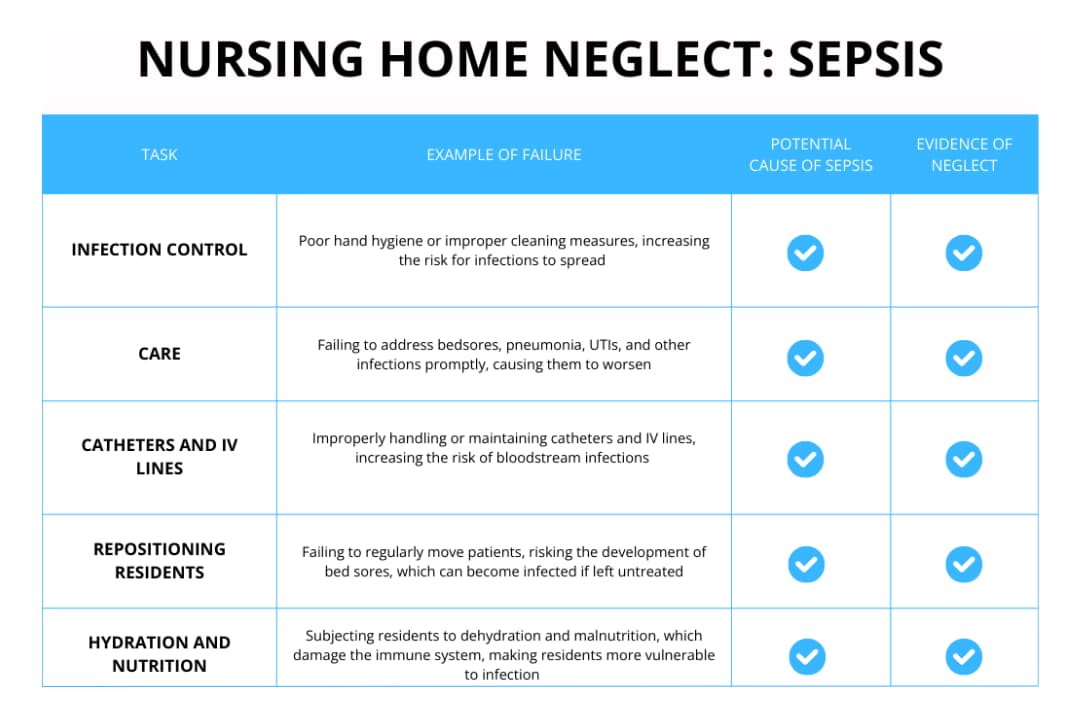Nursing Home Sepsis
Highly Skilled Abuse & Neglect Attorney
Bedsores · Wrongful Death · Medication Errors · Nursing Home Falls
Serving all of New Jersey & Pennsylvania including Philadelphia & Bucks Counties
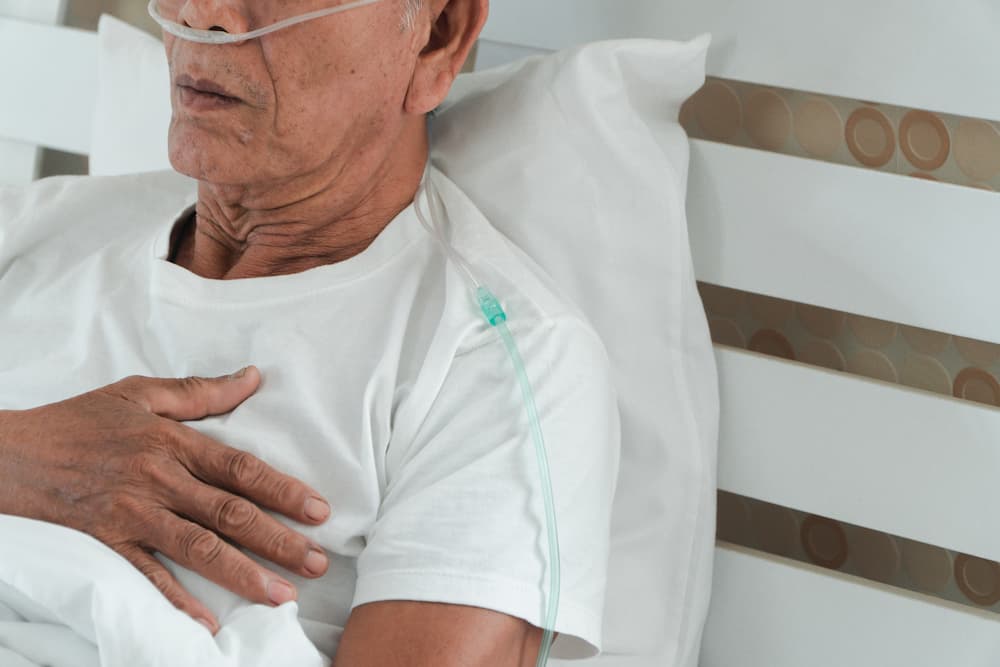
What is Nursing Home Sepsis?
Sepsis occurs when an infection enters the bloodstream and triggers an emergency inflammatory response in the body. It can cause tissue damage, organ failure, and even death.
Elderly people living in a nursing home are exposed to a variety of infections. It is the responsibility of nursing homes to protect residents from nursing home infections, including bed sores.
Residents who do become ill with an infection need proper treatment and close monitoring to prevent the development of sepsis. If sepsis does occur, and it can be traced to poor care or neglect, it is the nursing home’s fault.
Nursing home abuse attorney Brian P. Murphy is experienced in holding nursing homes accountable for neglect. If your family has suffered because of nursing home sepsis, request a free consultation today.
What Is the Risk of Sepsis?
The chances that a nursing home resident could develop sepsis —and die from it—are high. Residents living in a nursing home come in frequent contact with infections. Since many nursing home residents are elderly and suffer from poor health and weak immune systems, they can easily contract these infections and have difficulty fighting them. This puts them at a higher risk for sepsis.
Sepsis, an intense reaction to infection, can quickly become life-threatening. It is treatable if caught early, making the deadlier stages of sepsis avoidable.
Unfortunately, mistakes, neglect, and poor care in nursing homes increase the risks for developing severe sepsis, which can lead to tissue and organ damage. For many nursing home residents, this can be fatal.
If your loved one living in a nursing home or long-term-care facility has suffered from sepsis, you may be able to take legal action. The Law Firm of Brian P. Murphy, P.C., has successfully handled numerous nursing home sepsis cases across New Jersey and Pennsylvania, including Philadelphia. Get a free consultation.
How Common Is Sepsis in Nursing Homes?
According to the National Institutes of Health (NIH), nursing home residents are seven times more likely than non-nursing home residents to develop sepsis, especially severe cases.
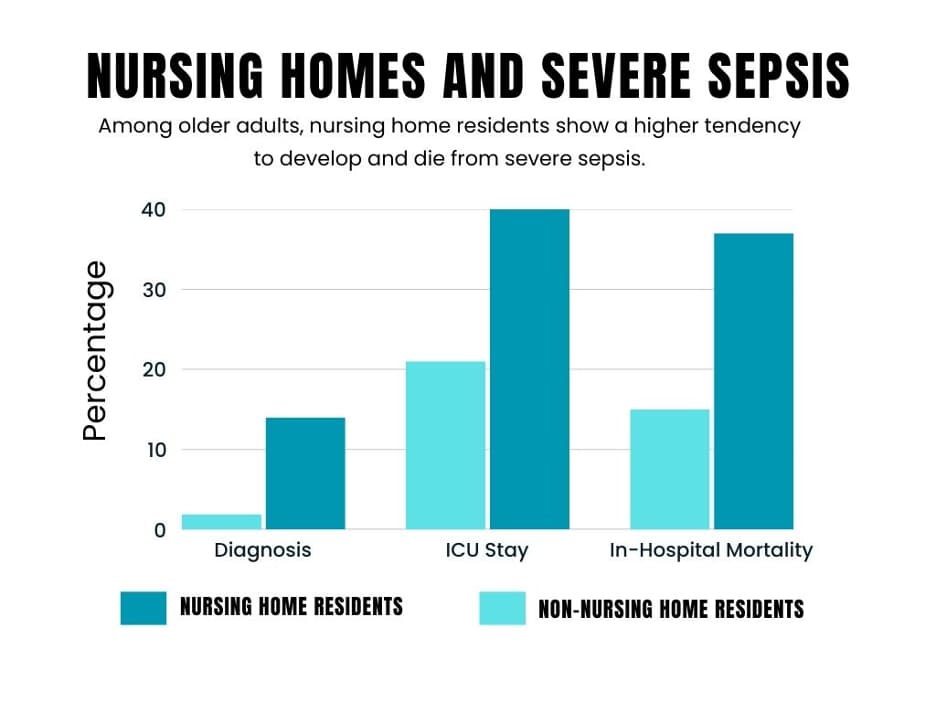
Risk Factors for Nursing Home Sepsis
Being 65 years or older is the top risk factor for sepsis in nursing homes.
Other factors include:
- Diabetes
- Kidney or liver disease
- A weak immune system or an immune system suppressed by medications like antibiotics and anti-inflammatory drugs
- Devices like catheters, IVs, and breathing tubes (could introduce infection)
- Long hospital stays (increased exposure to infection)
Nursing home sepsis often develops due to these types of infections:
- Urinary tract infections (UTIs)
- Gastrointestinal tract infections
- Respiratory tract infections (e.g. pneumonia, flu, common cold, RSV, COVID-19)
- Skin/soft tissue infections (e.g. bedsores)
Whether it is a bacterial, viral, fungal, or other kind of nursing home infection, if it is not quickly diagnosed and treated, sepsis could result.
Hospital-Acquired Infections
by Pennsylvania Long-Term-Care Residents
Below is a breakdown of the 486 hospital-acquired infections among Pennsylvania long-term residents from April 1, 2014, through March 31, 2016, as reported to the Pennsylvania Patient Service Authority:
Surviving Sepsis
What Are the Odds?
Once sepsis develops, it can rapidly become dangerous. Immediate hospital treatment is required. Without swift medical intervention, sepsis can progress within hours. Organ failure and death can result within days.
- According to the NIH, almost 50 percent of residents who have developed nursing home sepsis died while receiving hospital treatment.
Nursing Home Sepsis Stages
The more advanced sepsis is, the more difficult it is to survive it. Sepsis typically progresses in stages, from early-stage sepsis, to severe sepsis, to septic shock.
The Warning Signs for Nursing Home Sepsis
Sepsis is a serious illness that progresses rapidly if left unchecked. The following are signs a person is suffering from sepsis and require immediate emergency help:
- High fever
- Cold extremities
- Lethargy, anxiety, confusion, or agitation
- Rapid heart rate
- A pin-prick rash
- Nausea and vomiting
- Light sensitivity
- Severe pain/discomfort
Your loved one’s nursing home is responsible to ensure he or she is protected from sepsis. If your family has been affected by sepsis in a Philadelphia/Pennsylvania or New Jersey nursing home, secure your free consultation with The Law Firm of Brian P. Murphy, P.C., today.
Sepsis in Nursing Homes Is Preventable
Infection control measures help nursing homes protect vulnerable elderly residents from infection and sepsis. Such measures include the following:
- Keeping rooms and other areas and objects clean
- Wash hands after handling residents
- Ensure proper hygiene for residents
- Take preventative measures against pressure ulcers
- Make sure residents receive proper treatment for wounds
- Ensure residents receive proper nutrition
- Isolate residents who demonstrate symptoms of illness
- Observe infection control measures
If you’re concerned about lack of cleanliness in your loved one’s nursing homes, or if you notice unanswered call lights, untreated wounds and bedsores, or other signs of poor care in a nursing home, you should reach out to a nursing home malpractice attorney for advice.
When Are Nursing Homes Responsible for Sepsis?
Nursing homes have a duty to fulfill necessary tasks to protect their residents. If such tasks go incomplete, and sepsis occurs as a result, nursing home neglect has occurred.
Can You Sue a Nursing Home for Sepsis?
It is common for families whose loved ones suffered from nursing home sepsis to hire nursing home abuse attorneys. A skilled attorney can prove how insufficient care on the part of the home directly caused serious suffering and harm.
Your nursing home lawsuit may result in a settlement or go to trial, and so it is important to hire an experienced nursing home abuse lawyer who can handle every aspect of your case.
In cases when neglect and sepsis lead to death, families hire wrongful death attorneys to hold nursing homes accountable. It is important to secure a nursing home malpractice attorney, such as Brian P. Murphy, who has the experience to ensure families are justly compensated.
If your loved one living in a Pennsylvania or New Jersey nursing home has been impacted by abuse or neglect, contact Nursing Home Malpractice Attorney Brian Murphy to learn about your legal rights.
Your Trusted Advocate
Nursing Home Malprac tice Attorney Brian P. Murphy has nearly twenty years’ experience holding nursing homes accountable for abuse, negligence, and wrongful death. Thanks to his skilled litigation, Brian Murphy has won millions of dollars in compensation for his clients in New Jersey and Pennsylvania, including in Philadelphia.
tice Attorney Brian P. Murphy has nearly twenty years’ experience holding nursing homes accountable for abuse, negligence, and wrongful death. Thanks to his skilled litigation, Brian Murphy has won millions of dollars in compensation for his clients in New Jersey and Pennsylvania, including in Philadelphia.
Care facilities that fail their residents must be held responsible. Brian P. Murphy will fight to secure justice and fair compensation for NJ and PA families whose loved ones suffered as a result of nursing home sepsis. Don’t wait to schedule your free consultation.
Contact Nursing Home Attorney Brian P. Murphy right away.
This website is owned by The Law Firm of Brian P. Murphy, PC. Its purpose is to assist you in understanding your rights, especially when it comes to preventing or protecting yourself and/or your loved ones against nursing home failures, such as abuse, neglect, bedsores, dehydration, malnutrition, malpractice, and wrongful death. Legal matters are billed on a contingency fee basis. All cases are personally handled by Brian Murphy.
Nothing on this website is to be construed as attorney advice or otherwise creating an attorney-client relationship. If you may be interested in establishing a relationship with The Law Firm of Brian P. Murphy, PC, please contact us to discuss your options.

